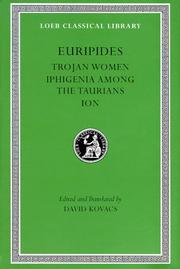| Listing 1 - 4 of 4 |
Sort by
|
Book
Abstract | Keywords | Export | Availability | Bookmark
 Loading...
Loading...Choose an application
- Reference Manager
- EndNote
- RefWorks (Direct export to RefWorks)
Medea --- consort of Aegeus --- King of Athens (Mythological character) --- Drama --- Seneca --- Lucius Annaeus --- approximately 4 B.C.-65 A.D. --- Translations into English --- Hecuba --- Queen of Troy
Book
Abstract | Keywords | Export | Availability | Bookmark
 Loading...
Loading...Choose an application
- Reference Manager
- EndNote
- RefWorks (Direct export to RefWorks)
Medea --- consort of Aegeus --- King of Athens (Mythological character) --- Drama --- Seneca --- Lucius Annaeus --- approximately 4 B.C.-65 A.D. --- Translations into English --- Hecuba --- Queen of Troy

ISBN: 0674995740 9780674995741 Year: 2014 Volume: 4 10 Publisher: Cambridge, MA : Harvard University Press,
Abstract | Keywords | Export | Availability | Bookmark
 Loading...
Loading...Choose an application
- Reference Manager
- EndNote
- RefWorks (Direct export to RefWorks)
Euripides (c. 485-406 BCE) has been prized in every age for his emotional and intellectual drama. Eighteen of his ninety or so plays survive complete, including Medea, Hippolytus, and Bacchae, one of the great masterpieces of the tragic genre. Fragments of his lost plays also survive.
Greek drama (Tragedy) --- Trojan War --- Languages & Literatures --- Greek & Latin Languages & Literatures --- Translations into English --- -Hecuba (Legendary character) --- -Ion (Greek mythology) --- -Iphigenia (Greek mythology) --- -Trojan War --- -Translations into English --- Drama --- Euripides --- -Mythology, Greek --- -Euripides --- Euripide --- Hecuba (Legendary character) --- Ion (Greek mythology) --- Iphigenia (Greek mythology) --- Translations into English. --- Drama. --- Bacchantes --- Cassandra (Legendary character) --- Helen of Troy (Greek mythology) --- Queens --- Royalty --- Rulers --- Sovereigns --- Maenads --- Hecuba, --- Ion --- Iphigenia --- Ifigeneia --- Ifigenia --- Ifigenija --- Ifigjenia --- Ifixenia --- Iphigeneia --- Iphigenie --- 伊菲革涅亚 --- イーピゲネイア --- איפיגניה --- 이피게네이아 --- Іфігенія --- Ифигенија --- Ифигения --- إيفيجينيا --- Ἰφιγένεια --- Ió --- Iōnas --- Ione --- Jonas --- 伊昂 --- 이온 --- Јон --- Іон --- Йон --- إيون --- Ἴων --- Ἰωνας --- Ecuba, --- Hecabe, --- Hécube, --- Hekaba, --- Hekabē, --- Hekabo, --- Hekuba, --- 赫库芭, --- ヘカベー, --- הקובה, --- 헤카베, --- Гекаба, --- Гекуба, --- Хекаба, --- Хекуба, --- هکابه, --- هيكوبا, --- Ἑκάβη, --- Ėvripid --- Yūrībīdīs --- Euripedes --- Eŭripido --- Eurypides --- Euripidesu --- אוריפידס --- エウリーピデース --- Εὐριπίδης --- Turkey --- Ilion (Extinct city) --- Ilium (Extinct city) --- Middle East --- Troia (Extinct city) --- Troja (Extinct city) --- Trovaharabesi (Extinct city) --- Troy --- Monarchy --- Women --- Courts and courtiers --- Empresses --- Kings and rulers --- Mythology, Greek --- Cults --- Dionysia --- Greek drama (Tragedy) - Translations into English. --- Hecuba (Legendary character) - Drama --- Iphigenia (Greek mythology) - Drama. --- Ion (Greek mythology) - Drama. --- Trojan War - Drama
Book
ISBN: 022637937X 022608390X 9780226083902 9780226083872 022608387X Year: 2014 Publisher: Chicago : University of Chicago Press,
Abstract | Keywords | Export | Availability | Bookmark
 Loading...
Loading...Choose an application
- Reference Manager
- EndNote
- RefWorks (Direct export to RefWorks)
In recent years, the rise of fundamentalism and a related turn to religion in the humanities have led to a powerful resurgence of interest in the problem of political theology. In a critique of this contemporary fascination with the theological underpinnings of modern politics, Victoria Kahn proposes a return to secularism-whose origins she locates in the art, literature, and political theory of the early modern period-and argues in defense of literature and art as a force for secular liberal culture. Kahn draws on theorists such as Carl Schmitt, Leo Strauss, Walter Benjamin, and Hannah Arendt and their readings of Shakespeare, Hobbes, Machiavelli, and Spinoza to illustrate that the dialogue between these modern and early modern figures can help us rethink the contemporary problem of political theology. Twentieth-century critics, she shows, saw the early modern period as a break from the older form of political theology that entailed the theological legitimization of the state. Rather, the period signaled a new emphasis on a secular notion of human agency and a new preoccupation with the ways art and fiction intersected the terrain of religion.
Political theology. --- Politics in literature. --- Theology in literature. --- European literature --- History and criticism. --- fundamentalism, religion, political theology, politics, secularism, art, literature, hannah arendt, walter benjamin, leo strauss, carl schmitt, spinoza, machiavelli, shakespeare, hobbes, state, power, authority, legitimacy, agency, history, philosophy, nonfiction, kingship, monarchy, royalty, hamlet, hecuba, freud, renaissance, imagination, liberation, oppression, revolution, rebellion, resistance, aesthetics.
| Listing 1 - 4 of 4 |
Sort by
|

 Search
Search Feedback
Feedback About
About Help
Help News
News